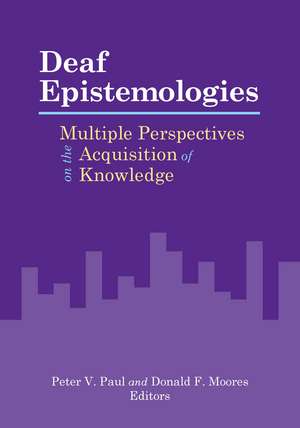Deaf Epistemologies: Multiple Perspectives on the Acquisition of Knowledge
Editat de Peter V. Paul, Donald F. Mooresen Limba Engleză Hardback – 30 apr 2012
Epistemology is the study of how “knowledge” is formed. Standard epistemology isolates the “known” from the “knowers,” thereby defining “knowledge” as objectively constant. Multiple epistemologies suggest that individuals learn in different ways shaped by life factors such as education, family, ethnicity, history, and regional beliefs. In this groundbreaking volume, editors Peter V. Paul and Donald F. Moores call on ten other noted scholars and researchers to join them in examining the many ways that deaf people see and acquire deaf knowledge.
This collection considers three major groups of deaf knowledge perspectives: sociological and anthropological, historical/psychological and literary, and educational and philosophical. The first explores the adoption of a naturalized, critical epistemological stance in evaluating research; the epistemology of a positive deaf identity; how personal epistemologies can help form deaf education policies; and valuing deaf indigenous knowledge in research. The next part considers dueling epistemologies in educating deaf learners; reforms in deaf education; the role of deaf children of hearing parents in creating Deaf epistemologies; and the benefit of reading literature with deaf characters for all students. The final part explores the application of the Qualitative-Similarity Hypothesis to deaf students’ acquisition of knowledge; a metaparadigm for literacy instruction in bilingual-bicultural education; collaborative knowledge-building to access academia; and examination of the benefits and disadvantages of being deaf.
This collection considers three major groups of deaf knowledge perspectives: sociological and anthropological, historical/psychological and literary, and educational and philosophical. The first explores the adoption of a naturalized, critical epistemological stance in evaluating research; the epistemology of a positive deaf identity; how personal epistemologies can help form deaf education policies; and valuing deaf indigenous knowledge in research. The next part considers dueling epistemologies in educating deaf learners; reforms in deaf education; the role of deaf children of hearing parents in creating Deaf epistemologies; and the benefit of reading literature with deaf characters for all students. The final part explores the application of the Qualitative-Similarity Hypothesis to deaf students’ acquisition of knowledge; a metaparadigm for literacy instruction in bilingual-bicultural education; collaborative knowledge-building to access academia; and examination of the benefits and disadvantages of being deaf.
Preț: 420.44 lei
Preț vechi: 525.17 lei
-20% Nou
Puncte Express: 631
Preț estimativ în valută:
80.46€ • 83.90$ • 66.87£
80.46€ • 83.90$ • 66.87£
Carte indisponibilă temporar
Doresc să fiu notificat când acest titlu va fi disponibil:
Se trimite...
Preluare comenzi: 021 569.72.76
Specificații
ISBN-13: 9781563685255
ISBN-10: 1563685256
Pagini: 320
Ilustrații: 1 table
Dimensiuni: 178 x 254 x 23 mm
Greutate: 0.71 kg
Ediția:1st Edition
Editura: Gallaudet University Press
Colecția Gallaudet University Press
ISBN-10: 1563685256
Pagini: 320
Ilustrații: 1 table
Dimensiuni: 178 x 254 x 23 mm
Greutate: 0.71 kg
Ediția:1st Edition
Editura: Gallaudet University Press
Colecția Gallaudet University Press
Notă biografică
Peter V. Paul is Professor, School of Teaching and Learning (Integrated Teaching & Learning Section), Ohio State University, Columbus, OH.
Donald F. Moores is Professor, Department of Exceptional Student and Deaf Education, University of North Florida, Jacksonville, FL.
Donald F. Moores is Professor, Department of Exceptional Student and Deaf Education, University of North Florida, Jacksonville, FL.
Descriere
In this groundbreaking volume, a dozen noted scholars and researchers examine the many ways that deaf people see and acquire deaf knowledge.
